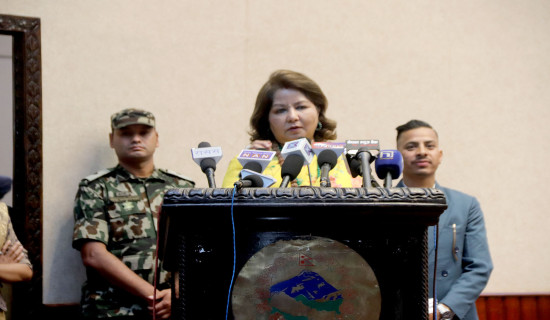- Thursday, 17 April 2025
Nepal’s progress notable to cut maternal and child mortality
By A Staff Reporter,Kathmandu, Apr. 9: Minister for Health and Population, Pradip Paudel, has addressed the 58th session of the Commission on Population and Development held at the United Nations Headquarters.
In his address, Minister Paudel highlighted Nepal's significant progress over the last three decades in reducing maternal and child mortality. He also noted the country’s success in improving the efficiency and uptake of family planning methods, reducing fertility and adolescent birth rates, and combating child marriage.
Minister Paudel reaffirmed Nepal’s commitment to strengthening its healthcare system and providing health facilities to every citizen. However, he acknowledged that this would not be possible without international support.
He emphasised that such improvements could only be achieved through international cooperation and solidarity. Minister Paudel acknowledged the challenges posed by inadequate infrastructure development and a shortage of health institutions in rural areas, which hinder access to healthcare.
He also addressed the impact of climate change, specially its impact in health sector. “As climate change and natural disasters increase, it is crucial to strengthen the resilience of the health system to handle emergencies more effectively,” said Minister Paudel. He further added that countries like Nepal are struggling due to the lack of sufficient development assistance. “To address this issue, we are placing special emphasis on increasing development aid to Nepal,” he added.
He reiterated that such support is vital for achieving universal access to health services and underlined the importance of increased investment from the private sector in healthcare.
Minister Paudel is leading Nepal’s delegation at the five-day session, which began on Tuesday.
Ambassador Lok Bahadur Thapa, Head of the Nepali Permanent Mission to the United Nations in New York, informed that during his visit to New York, Minister Paudel will hold bilateral talks and gather suggestions from the Nepali community there for improving health services.
Meanwhile, Nepal has marked a remarkable milestone in maternal health, achieving a more than 70 per cent reduction in maternal mortality since 2000, according to a new United Nations report released on World Health Day. The country’s Maternal Mortality Rate (MMR) now stands at 142 per 100,000 live births, showcasing one of the more successful public health improvements in the region.
The ‘Trends in Maternal Mortality’ report, published by the United Nations, revealed that global maternal deaths have dropped by 40 per cent between 2000 and 2023. However, it also raised alarms about a slowdown in progress, with 260,000 women still dying from pregnancy or childbirth-related complications in 2023 — equivalent to one death every two minutes.
Nepal’s success story also includes a neonatal mortality rate of 16.6 per 1,000 live births and a stillbirth rate reduced to 13.5 per 1,000 births, informed the UN in a statement.
Health experts credited this progress to improved access to essential maternal and newborn health services. Yet, they warned that persistent inequalities in healthcare access across provinces remain a serious concern.
While celebrating Nepal’s progress, Dr. Rajesh Sambhajirao Pandav, WHO Representative to Nepal, emphasised the need for continued investment. “To close this gap and to ensure Nepal continues to stay on track to meet the Sustainable Development Goals, we must prioritise women’s and newborns’ health and wellbeing,” he stated.
However, the global situation remains precarious. The UN agencies caution that widespread cuts in humanitarian aid are putting essential services at risk, especially in conflict-affected or fragile countries where nearly two-thirds of maternal deaths now occur. Facility closures, staff shortages and supply disruptions are already being reported.
According to the report, the global maternal mortality ratio needs to fall by around 15 per cent annually to meet the UN’s 2030 target — a steep rise from the current 1.5 cent annual decline.
As World Health Day 2025 echoes the theme ‘Healthy beginnings, hopeful futures’, experts urge governments and donors to renew their commitments to maternal health — warning that without urgent action, progress could quickly unravel.
















